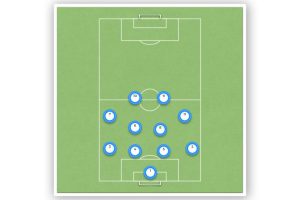Mindfulness And Meditation For Soccer Coaches
Welcome soccer coaches! Are you looking for an edge over your competition? Mindfulness and meditation are powerful tools to help you become a better coach. Not only can they help improve your team’s performance, but they also have benefits for your personal well-being too. In this article, I’ll be sharing tips on how to incorporate mindfulness and meditation into your coaching practice.
Mindfulness is the practice of being present in the moment, without judgement or attachment. This awareness allows us to gain insight into ourselves and our environment, giving us clarity and focus. Meditation is a great way to deepen our mindfulness practice as it helps us learn how to pay attention in a sustained way. When used together, mindfulness and meditation offer many benefits for soccer coaches like improved concentration, enhanced decision making skills, increased creativity and improved communication with players.
By learning more about these practices and incorporating them into your daily routine, you can take your coaching game to the next level! So let’s get started!
Definition Of Mindfulness And Meditation
Mindfulness and meditation are powerful tools for soccer coaches to help their players perform at their peak. The definitions of both mindfulness and meditation can be summed up quickly; mindfulness is the practice of being aware of one’s thoughts, feelings, emotions, and physical sensations in the present moment without judgment. Meditation is a practice that involves focusing on the breath or an object for a sustained period of time.
Mindful meditation is a combination of the two practices. It is when one brings mindful awareness to their meditation practice, allowing them to observe their thoughts and emotions without judgment as they arise in response to the focus object. When practiced regularly, mindfulness practices and meditation techniques can help soccer coaches become more aware of themselves and their players, as well as help them develop strategies to handle difficult moments during games. This heightened sense of awareness will not only help coaches make better decisions on the field but also lead to better relationships with players off the field.
Benefits For Soccer Coaches
Mindfulness and meditation can offer a wealth of benefits to soccer coaches. By incorporating these mental practices into their coaching style, they can foster a positive environment for their team while gaining insight into their own thought processes. Through the use of meditative techniques, soccer coaches can hone in on their focus strategies and become better attuned to their players’ needs.
The benefits of mindfulness and meditation are far-reaching, from improved decision making to reduced stress levels. Coaches can use these mental practices to gain clarity on the field and stay in the moment during games and training sessions. With a greater sense of presence, they can become more aware of their players’ performance, enabling them to make more informed decisions on the spot. Mindfulness also allows them to cultivate emotional intelligence and gain insight into how they interact with their team from an emotional standpoint.
Mindfulness and meditation provide soccer coaches with invaluable tools for achieving peak performance both in themselves and in their players. These mental practices enable them to cultivate an enhanced focus that not only strengthens team dynamics but also leads to improved outcomes on the field. By incorporating mindfulness into their coaching style, soccer coaches can positively impact the lives of both themselves and their players through increased self-awareness, focus, and emotional intelligence.
Mental Practices For Soccer Coaches
Mental practices for soccer coaches are as important as physical practices. Mindful meditation can help soccer coaches stay focused and concentrated on the game, while also calming their minds. It is an effective technique that can be used to reduce stress and tension in the body and mind.
When practicing mindful meditation, it is essential to keep your thoughts focused on the present moment without judging them. This will help you stay aware of your own emotional state and how it affects your team. Additionally, it is important to practice deep breathing exercises which will help regulate emotions and improve concentration. Practicing these mental practices consistently will not only increase focus and awareness during a game but also better prepare a coach mentally for any challenges they may face throughout a season.
Mindfulness and meditation can be incorporated into pre-game rituals and warmups, allowing coaches to ease into the right mental state for the match ahead. By focusing on presence of mind, breath work, and visualization techniques, soccer coaches can ensure that they have a clear mind when facing any situation on or off the field.
Techniques To Develop Focus And Concentration
Mindfulness and meditation can be powerful tools for soccer coaches to develop focus and concentration, helping their players become more mindful of their performance on the field. There are several focus techniques that soccer coaches can incorporate into their mindfulness practice to improve concentration:
- Deep Breathing – Taking deep breaths is a great way to center yourself before a game or practice and reduce stress levels.
- Body Scanning – This exercise involves consciously noticing and accepting physical sensations in your body, which helps to increase awareness of tension or discomfort.
- Visualization – Visualizing yourself scoring a goal or making an assist can help strengthen your confidence and mental focus when playing soccer.
- Mindful Concentration – Practicing mindful concentration can help you stay focused on the task at hand while also being aware of your surroundings and environment.
These techniques are just some of the ways that soccer coaches can use mindfulness and meditation to develop focus and concentration for their players. With regular practice, these techniques can help your team become more mindful and aware of themselves, leading to improved performance on the field.
Strategies For Calming The Mind
Studies have shown that mindful strategies, such as meditation and mindfulness-based interventions, can reduce stress levels among athletes by up to 30%. Soccer coaches who are looking to help their athletes calm their minds and focus on the game could benefit from incorporating mindfulness and meditation into their training sessions.
Mindfulness exercises can be incorporated in many different ways. For example, a coach might start each practice with a few minutes of mindful breathing or body scanning exercises. This will allow players to check in with themselves and become aware of any tension they may be holding in their bodies. Additionally, the coach could lead guided visualisations or relaxation scripts before or after practice to help players alleviate any stress they may be feeling.
Furthermore, coaches can employ more subtle yet effective calming techniques throughout practice. These can include having players take deep breaths on the sidelines when transitioning between drills or taking brief pauses during drills for players to become aware of their thoughts and feelings. Mindful strategies like these can help create an environment where players are better able to focus on the task at hand and stay present in the moment instead of worrying about future outcomes.
By introducing these techniques into soccer coaching practices, coaches will create an atmosphere that is conducive to developing mental strength and resilience among athletes. It is important for coaches to model these calming practices themselves so that they become part of the team’s culture. With regular implementation of mindfulness and meditation exercises, soccer teams will soon experience improved performance on the field due to increased focus and concentration among its players.
Preparing The Body For Meditation
Meditation preparation is essential for soccer coaches looking to incorporate mindfulness and meditation into their coaching routine. The first step in mindful meditation is to begin with a few minutes of mindful breathing. This helps the coach become aware of the body and physical relaxation, while also aiding in mental preparation.
Focusing on the breath helps to clear the mind and establish a relaxed state, while also helping to foster a sense of peace and stillness. During this practice, it is important for soccer coaches to take note of any feelings or sensations that arise in the body, as well as any thoughts that come into awareness. This will help create an environment for deeper levels of inner exploration during meditation.
Once this initial stage has been established, soccer coaches can then focus on specific areas within their body that may need more attention or relaxation. Acknowledging any physical discomfort can help open up new possibilities for personal growth and development. In addition, developing a heightened sense of body awareness can lead to better self-regulation during competition or training sessions. As such, preparing oneself with mindful meditation can be beneficial both on and off the pitch!
Structure Of A Mindful Meditation Session
Picture yourself in a quiet soccer field. The sun is setting, and the light is fading away. A gentle breeze rustles through the trees as you sit in the middle of the grass. You close your eyes and take a few deep breaths. You are ready to begin your mindful meditation session structure.
Your first step is to create a comfortable environment for your meditation session. Find a peaceful spot that allows you to be undisturbed and helps you to relax. Set up your mindful meditation setup with whatever props or decorations you need to create the atmosphere that works best for you, such as candles, incense, plants, or calming music. Once everything is in place, it’s time to start.
The next step of your guided meditation structure is to focus on your breath. Pay attention to each inhalation and exhalation, focusing on how it feels in your body and allowing any thoughts or sensations that arise to pass without judgement or clinging onto them. This will help keep your mind from wandering off too far and will bring you back into the present moment more easily. After a few moments of simply observing your breath, move onto deeper relaxation techniques such as visualization and progressive muscle relaxation (PMR). Visualize yourself in a calm space with healing energy surrounding you and imagine all tension melting away from each part of your body as you repeat positive affirmations aloud or silently in order to further enhance the relaxation process. With each mindful meditation order that passes by, be sure to check-in with yourself regularly throughout this practice so that you can better adjust any elements if needed while still keeping within the overarching mindful meditation plan of achieving deep relaxation and inner peace by the end of it all.
Post-Session Reflection And Evaluation
Once coaches have completed their mindfulness and meditation session, it is important to take a few minutes for post-session reflection and evaluation. This allows them to assess the effectiveness of their session and make any necessary adjustments before their next one. Here are four steps to help coaches in this process:
- Take some time to observe your thoughts, emotions, and physical sensations. Notice what comes up during this time, without judgment or attachment.
- Reflect on the goals you set for yourself prior to the session. How did they show up throughout the session? What areas can be improved upon?
- Ask yourself questions such as “How was my energy level during the session?” or “Did I feel calm or tense?”
- Make an honest assessment of how well you achieved your goals. Identify any areas that need improvement for future sessions.
Post-session reflection and evaluation is also important following soccer games and practices as well. It is a useful tool for coaches to gain insight into their performance and create strategies for personal growth. Understanding one’s own personal weaknesses can help them become more effective in guiding their team towards success. Taking the time after a game or practice to reflect can be beneficial in helping coaches develop a greater understanding of themselves and their team dynamics.
Integrating Mindfulness Into Practice Plans
Mindfulness and meditation practices can be invaluable tools for soccer coaches to include in their practice plans. Integrating these practices into a team’s routine can bring about tremendous benefits, both on and off the field. Mindfulness helps players to increase their focus and be more aware of their thoughts and emotions as they play. It also helps them to become more adept at regulating their responses during stressful match situations. Meditation can help coaches create a calming atmosphere before and after games, allowing players to develop greater self-awareness when dealing with challenging circumstances.
Incorporating mindfulness and meditation techniques into practice plans is relatively straightforward. Coaches can start by teaching basic mindfulness skills such as breathing exercises or body scans. These can be done either before or during practice sessions, depending on the particular needs of the team at that time. Additionally, coaches may want to set aside some time for guided meditations that can help players relax before games or process emotions afterwards. By integrating these practices into their teams’ routines, soccer coaches can help cultivate a more mindful approach to training and competition which will ultimately improve performance on the pitch.
Resources For Soccer Coaches
As a soccer coach, there are many resources available to you that can help to improve your coaching techniques and strategies. From meditation and mindfulness resources to specific soccer coaching resources, it is important to be aware of the vast array of options available.
In order to access the most effective soccer coaching resources, it is important to have an understanding of what type of content is best suited for your needs. Meditation and mindfulness resources can provide you with tools to help elevate both your physical and mental performance as a coach. Additionally, there are numerous soccer meditation exercises which can be utilized during practice sessions in order for coaches to remain focused on their team’s development.
On top of meditation and mindfulness resources, soccer coaches should also consider utilizing other types of coaching-specific materials such as books, videos, seminars, and webinars. These resources will provide valuable insight into how best to manage teams, build relationships with players, and develop successful game strategies. By having access to these various types of materials, you will be able to stay up-to-date on the latest trends in soccer coaching.
Ultimately, having access to diverse resources for soccer coaches can significantly improve your overall experience as a coach. As a result, it is beneficial for both you and your team if you take advantage of all the tools available at your disposal.
Frequently Asked Questions
What Are The Best Times Of Day To Practice Mindfulness And Meditation?
When it comes to mindfulness and meditation practice, it’s best for soccer coaches to find the most beneficial times for them during their daily routine. While there is not one specific time that works for everyone, some general guidelines can be helpful when finding the best time of day for daily meditation and mindfulness.
Establishing a regular meditation and mindfulness practice will help soccer coaches stay balanced, focused, and relaxed while on the field. It’s important to consider how much time you have available in your daily schedule so that you can create a mindful or meditative practice that fits into your life. While mornings are generally thought of as optimal times to practice, if you’re an evening person, late afternoon or early evenings may work better for you.
The key is to find a time that works with your schedule so that you can stick with it on a regular basis. If you’re unable to set aside a longer block of time, even just five to ten minutes each day can still be beneficial for fostering greater mental clarity and stress relief for soccer coaches.
How Long Should A Meditation Session Typically Last?
When it comes to meditation and mindfulness, the length of a session can vary greatly depending on the individual. Generally speaking, an effective session should last anywhere from 5-20 minutes. It’s important to keep in mind that this is merely a guideline and not a hard and fast rule. Everyone has different needs and abilities when it comes to meditating, so it’s best to experiment with different lengths until you find what works best for you.
The following are some tips for finding out the length of your ideal meditation or mindfulness session:
- Start small – start with just five minutes and gradually add more time as you become more comfortable with the practice.
- Listen to your body – if you’re feeling tired or overwhelmed, take a shorter session or break. If you feel energized, keep going until you reach a state of peace and stillness.
- Find balance – long sessions are great for deepening your practice, but short sessions can also be beneficial for maintaining clarity throughout the day.
- Incorporate other activities – combine meditation with yoga or other mindful activities such as walking or journaling for a longer but more varied experience.
- Prioritize consistency – aim to practice regularly rather than focusing solely on the duration of each session. This will help build up your concentration and focus over time.
No matter what length of time you choose to dedicate to your practice, it can be incredibly beneficial in improving focus and reducing stress levels in both soccer coaches and their players alike. Mindfulness helps cultivate awareness, which leads to greater understanding of one’s emotions as well as those of others around them. With regular practice, soccer coaches can foster an atmosphere of acceptance while helping their players learn how to manage their thoughts and reactions more effectively on the field.
Are There Any Risks Associated With Mindfulness And Meditation?
When it comes to mindfulness and meditation, one of the primary questions that many people have is: are there any risks associated with these practices? It is important to understand the potential risks of mindfulness and meditation before beginning a practice.
The most common risks of mindfulness and meditation include:
- physical discomfort such as dizziness, headaches or nausea
- feelings of anxiety or fear
- difficulty concentrating
- potentially triggering mental health issues such as depression or PTSD.
Fortunately, these risks can be minimized by following a few simple guidelines. Mindfulness and meditation should always be approached in a safe and gentle manner, without pushing yourself too hard. Additionally, it’s important to slow down your breathing during meditation sessions in order to avoid any physical discomfort. If you feel overwhelmed or triggered by your practice, you may want to take a break or seek professional help. As soccer coaches introducing their players to mindfulness and meditation, it is best to start slowly with small sessions (5-10 minutes) so that everyone feels comfortable and safe while practicing. By preparing adequately for each session and keeping an eye out for any potential issues that could arise, soccer coaches can ensure the safety of their players while engaging in mindful activities.
What Are The Most Popular Meditation Apps For Soccer Coaches?
Meditation apps have become increasingly popular among soccer coaches looking to incorporate mindfulness practices into their coaching. With a wide array of meditation apps available, it can be difficult for soccer coaches to decide which one is best suited for them and their players. To make the decision easier, we’ve identified the most popular meditation apps for soccer coaches who are looking to introduce mindfulness practices into their training sessions.
Mindfulness and meditation can have a positive impact on both the physical and mental performance of soccer players. These apps offer a range of features that can help soccer coaches deliver effective mindfulness practices to their players. Features such as guided meditations, audio instruction and visual aids can help soccer coaches provide an enriching experience for their athletes, helping them to stay focused and perform at their best on match day. Additionally, these apps will often include valuable resources such as articles and videos that can help educate both the coach and player about the importance of mindfulness in sport.
With so many options available, it’s important for soccer coaches to research which meditation app is right for them. Doing this research will ensure they find an app that suits their needs and provides meaningful benefits to both themselves and their team. By choosing the perfect meditation app, coaches will be able to harness the power of mindfulness to unlock potential within themselves and their players.
Are There Any Exercises That Can Be Used To Help Soccer Players Learn Mindfulness And Meditation?
Exploring the realm of mindful meditation for soccer players is a worthwhile endeavour that can help cultivate a harmonious environment for success. Meditation exercises provide an invaluable tool for coaches to help shape the minds of their players, allowing them to reach their full potential.
Meditation techniques are multifaceted and have been used by athletes from all sports to improve focus and performance. Soccer coaches can use mindful meditation as an exercise to enable their players to acquire skills such as mental clarity, concentration, and relaxation. Through regular practice of these meditative exercises, soccer players can learn how to become more aware of their thoughts and emotions in order to manage them better during stressful situations on the field.
There is a plethora of meditation resources available to coaches seeking methods that will allow their players to tap into the power of mindfulness while playing soccer. Whether they choose guided meditations or simplified breathing exercises, these tools will help soccer players become more mindful both on and off the pitch. Coaches should take some time to explore the different meditation strategies out there in order to find the most suitable one for their team. Ultimately, by incorporating these practices into their coaching program, soccer teams can benefit from improved focus, resilience and overall performance.
Conclusion
Mindfulness and meditation can be an invaluable tool for soccer coaches. It helps them to stay in the moment, remain calm amidst chaos, and be more aware of their own thoughts, feelings, and actions. Practicing mindfulness and meditation at the right times of day – typically early morning or before bedtime – is key to seeing its full benefits. Moreover, it’s important to make sure that sessions are not too long; usually a 15 minute period is enough.
There are also exercises that soccer players can do to learn how to practice mindfulness and meditation. For example, focusing on breathing deeply for a few minutes can help them become more aware of their body and any sensations they may be feeling. They might also try visualization exercises which can help them better understand the game from a different perspective.
Ultimately, mindfulness and meditation can open up new pathways for coaches and players alike. It allows coaches to become more self-aware when making decisions on the field, while also enabling players to gain a deeper understanding of themselves as athletes. By using these techniques regularly, soccer teams will undoubtedly see an improvement in their performance both on and off the pitch.






